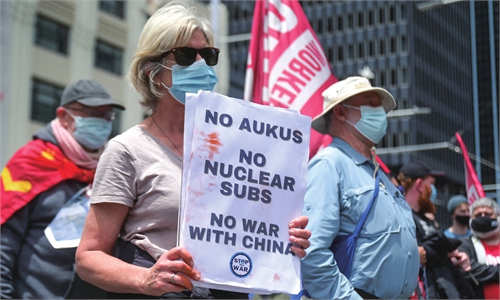Australia’s prosperity relies on China’s economic success, not its failure: former Australian official

The Sydney Opera House (left) and Shanghai Oriental Pearl Tower. Photos: VCG
Editor's Note:
Australia's hawkish posture toward China is dangerous and unnecessary, Percy Allan (Allan), a former Australian official, who wrote a series of articles - "China is not a threat: debunking the US narrative" - told the Global Times (GT) reporter Li Aixin in an interview. Alan, a visiting professor at the Institute for Public Policy and Governance, University of Technology Sydney, former secretary of New South Wales (NSW) Treasury and Chair of NSW premier's Council on the Cost and Quality of Government, stressed in the interview, "our prosperity relies on China's economic success, not its failure."

Percy Allan Photo: Courtesy of Allan
GT: Why did you decide to write the series, "China is not a threat: debunking the US narrative"?
Allan: My concern is that foreign policy hawks in the Australian government, strategic think tanks and the mass media have created a false narrative that Australia is militarily and economically threatened by China. This has caused most Australians to shift from viewing China as an economic partner to fearing it as an enemy threatening our sovereignty. Consequently, Australia has changed its military posture from defending our mainland and smaller South Pacific neighbors to a forward thrust into north Asia to help the US strike China at close range in the event of war. I think this change in mentality and posture is provocative, dangerous, and unnecessary. Moreover, it reverts to Australia's traditional Anglo paranoia about Asia being a threat rather than an opportunity even though our economy is complementary to Asia (particularly China) and thanks to immigration the average Australian by 2100 will be Eurasian by ancestry.
GT: Among the seven reasons listed in the articles to support the view that China is not a threat, which of them do you think is the most crucial one?
Allan: I think the most important is that China's stated foreign policy and practice respects the national sovereignty of other nations. Unlike the US, Russia and others, modern China has not conquered and occupied another nation. Its objectives have been the same for the past twenty years, namely "to oppose hegemonism, power politics, aggression and expansion in whatever form, as well as encroachments perpetrated by one country on the sovereignty and territorial integrity of another, or interference in the internal affairs of another nation under the pretext of ethnic, religious or human rights ..." Speeches by China's president and other senior officials keep stressing that China wants more stable bilateral ties with the US and adherence to the principles of "mutual respect, peaceful co-existence and win-win cooperation".
If China were planning to attack US territory or takeover its neighbors like imperial Japan or Nazi Germany it would be firing up its citizens for war. Instead, its focus is on securing its existing borders, not expanding them. If China was an imperialist power, it would have invaded Mongolia which is almost three times the size of Ukraine, is mineral rich and has only a small standing army. Instead, China invests in and trades with Mongolia and respects its Western style democracy.
GT: Regarding the upcoming US election, some US allies raised concerns. "Politically, 2024 is the Voldemort of years," reads the latest report issued by Eurasia Group, a US-based global political risk research and consulting firm. The top global risks listed in the report are "the US vs itself." Do you think there could be potential spillover risks of US politics and US elections on US allies, like Australia?
Allan: A second Trump presidency would intensify America's economic autarky, scuttle global efforts to stop climate change and dangerously polarize American society. The one redeeming feature of Trump is that his isolationist instinct makes him opposed to "forever wars" which his country's military industrial complex thrives on, and to which Biden acquiesces. Trump wants US' allies to safeguard their own sovereignty rather than rely on US overseas bases to do so. He wants them to cooperate on military defense but not expect America to be the "world's policeman". Such a multipolar world could make for more tolerance of national political differences rather than trying as Biden does to pit "democracies" against "autocracies".
In the West we cherish individual freedom and consider that as sacrosanct. But in developing countries protection from criminal gangs and civil war, adequate shelter and food, and basic education and health services are the most pressing needs. If autocratic regimes can't provide these essentials, they lose the confidence of their citizens and face unrest. In such cases internal revolt rather than external intervention should be left to force reform. Efforts to impose change from outside by political subversion, military interference, or financial and economic sanctions backfire because they allow rulers to blame foreign powers for their failures and to demonize reformers as foreign agents. Hence it is best to leave countries to resolve their own problems unless all members of the UN Security Council agree that a multinational peacekeeping force is necessary to save a nation from itself.
GT: "Australia's foreign policy being tied up to the US" VS "the hyping up of so-called China threat," which one is more harmful to Australia?
Allan: The two are indivisible. The more the "Chinese threat" is hyped up the more Australia is inclined to shift its military from "interoperability" to "interchangeability" with the US armed forces. That means instead of doing joint military exercise with the US as we have done in the past, Australia fuses its forces with Americas and becomes a base for the US army, navy, air force, and its military communication and cyber intelligence. My concern with that is two-fold, Firstly, if our military is an adjunct of America's, it is hard for it to act independently. That means our foreign policy becomes a hostage of America's, dragging us into conflicts not in our interest. Secondly, if Australia becomes US' prime land base in Asia for confronting China, then in any war we could become collateral damage before America's mainland was threatened.
GT: Reports show that Japan and Australia are discussing potential military cooperation in case of simultaneous contingencies in their nearby regions and increasing the sophistication and frequency of joint drills between the Self-Defense Forces and the Australian military. What do you think the two countries' enhancing military cooperation signals?
Allan: I have no problem with Australia cooperating with other nations in joint military training and exercises if it's within their own sovereign territories and waters. But they should avoid doing so near other nations not engaged in these exercises since that can cause alarm. China conducts joint military exercises with Russia, Pakistan, India, Kazakhstan, Cambodia, Laos, Malaysia, Thailand, and Vietnam. Australia and China used to conduct joint military operations before relations got strained. China's Ambassador to Australia has proposed their resumption to further develop and consolidate "the relationship between the two nations after a year of improving dialogue" Since China is not our enemy I can't see why not. Indeed, it could help defuse suspicions and develop trust between the two countries' military personnel.
GT: Where do you think QUAD and AUKUS are headed? Do you find them sustainable?
Allan: In March 2021, the members of the Quadrilateral Security Dialogue - the US, India, Japan, and Australia - stated they had "a shared vision for a Free and Open Indo-Pacific," and a "rules-based maritime order in the East and South China seas" since this was needed to counter Chinese maritime claims. I'm not sure what that meant in practice since the US and its allies did not try to stop China building facilities in the South China Sea that they claim are for military purposes, a claim that China disputes. Also, China has never impeded the free movement of commercial shipping and civilian aircraft to and from China or between countries in the Indo-Pacific. Indeed, as the world's largest trading nation it is in China's interest to maintain a free and open rule based maritime order if it is for peaceful purposes.
My understanding is that China objects to other navies and air forces patrolling its nearby seas to menace its defense forces. Australia's military should avoid that. We are not a nuclear superpower that can take on China. Nor should we want to since China is not our avowed enemy or shows any inclination to attack us. Furthermore, our prosperity relies on China's economic success, not its failure. We risk falling into the trap of "what's good for the goose is good for the gander." In other words, our behavior toward China could dictate its behavior toward us. If Australia wants to conduct military operations near China, China will have the excuse to do the same to Australia. If China was to undertake regular naval and air force patrols near Australia's coastline to ensure "freedom of navigation" between Australia and China, we would rightly be alarmed. Yet we expect joint military exercises between us and America off China's shores to be acceptable to it.
On AUKUS it's not clear to me why we need nuclear powered submarines, especially to build our own which is beyond our technical capacity. AUKUS submarines would be attack craft that can fire long range cruise missiles on land-based targets. Because such subs can stay underwater without refueling, they are especially useful for superpowers with nuclear weapons that want to travel far distance and quietly stay there for an extended period without resurfacing. They mean a potential adversary would never win a war because the outcome could be determined by a nuclear missile strike launched beneath the sea off its mainland. This MAD (mutually assured destruction) capacity keeps the peace. But since Australia has pledged not to acquire nuclear weapons its AUKUS submarines would only fire missiles with conventional warheads which if used against a nuclear superpower could invite nuclear retaliation. Furthermore, being few and designed to operate well beyond Australia's shores implies our subs would accompany the US navy. China and other Asian nations could view that as provocative.

